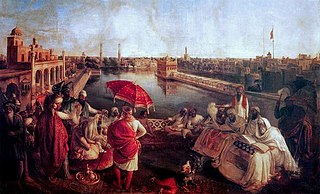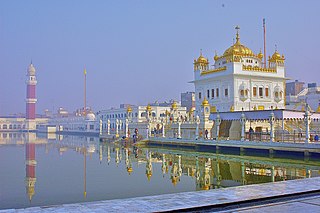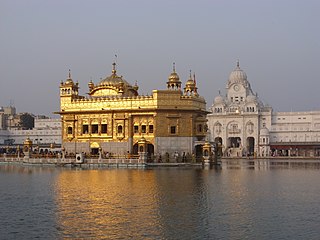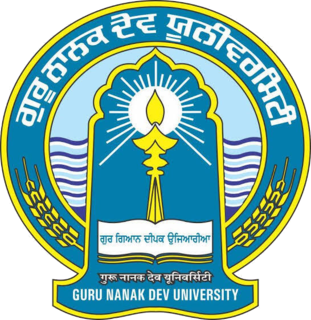
Sikhs are an ethnoreligious group who adhere to Sikhism, a religion that originated in the late 15th century in the Punjab region of the Indian subcontinent, based on the revelation of Guru Nanak. The term Sikh has its origin in the Sanskrit word śiṣya, meaning 'seeker', 'disciple' or 'student'.

Vaisakhi, also known as Baisakhi, marks the first day of the month of Vaisakh and is traditionally celebrated annually on 13 April and sometimes 14 April. It is seen as a spring harvest celebration primarily in Punjab and Northern India. Whilst it is culturally significant as a festival of harvest, in many parts of India, Vaisakhi is also the date for the Indian Solar New Year.

Tarn Taran Sahib is a city in the Majha region of the state of Punjab, in northern India. It is the district headquarters and hosts the municipal council of Tarn Taran district. Gurdwara Sri Tarn Taran Sahib, a prominent Sikh shrine, is located in the central part of the city.

Nanak Singh,, was an Indian poet, songwriter, and novelist of the Punjabi language. His literary works in support of India's independence movement led the British to arrest him. He published novels that won him literary acclaim.

Gurdaspur district is a district in the Majha region of the state of Punjab, India. Gurdaspur is the district headquarters. It internationally borders Narowal District of Pakistani Punjab, and the districts of Amritsar, Pathankot, Kapurthala and Hoshiarpur. Two main rivers Beas and Ravi passes through the district. The Mughal emperor Akbar is said to have been enthroned in a garden near Kalanaur, a historically important town in the district. The district is at the foothills of the Himalayas.

Amritsar district is one of the twenty three districts that make up the Indian state of Punjab. Located in the Majha region of Punjab, the city of Amritsar is the headquarters of this district.

The Akal Takht is one of five takhts of the Sikhs. It is located in the Darbar Sahib complex in Amritsar, Punjab, India. The Akal Takht was built by Guru Hargobind as a place of justice and consideration of temporal issues; the highest seat of earthly authority of the Khalsa and the place of the Jathedar, the highest spokesman of the Sikhs.

Batala is the eighth largest city in the state of Punjab, India in terms of population after Ludhiana, Amritsar, Jalandhar, Patiala, Bathinda, Mohali and Hoshiarpur. Batala ranks as the second-oldest city after Bathinda. It is a municipal corporation in Gurdaspur district in the Majha region of the state of Punjab. It is located about 32 km from Gurdaspur, the headquarters of the district. It is also a Police district. Batala holds the status of the most populated town of the district with 31% of the district's total population. It is the biggest industrial town in the district.

Guru Nanak Dev University is a state university in the Amritsar, India. It also offers many higher studies degree courses online. The university's campus is spread over 500 acres (200 ha).

Khalsa College is a historic educational institution in the northern Indian city of Amritsar in the state of Punjab, India. Founded in 1892, the sprawling 300-acre (1.2 km2) campus is located about eight kilometers from the city-center on the Amritsar-Lahore highway, adjoining Guru Nanak Dev University campus, to which Khalsa College is academically affiliated.
Guru Nanak founded the Sikh religion in the Punjab region of the northern part of the Indian subcontinent in the 15th century and opposed many traditional practices like fasting, Upanayana, idolatry, caste system, ascetism, azan, economic materialism, and gender discrimination.

Sobha Singh was an artist from Punjab, India.
The Sikhs are adherents to Sikhism, the fifth largest organized religion in the world, with around 25 million adherents. Sikh History is around 500 years and in that time the Sikhs have developed unique expressions of art and culture which are influenced by their faith and synthesize traditions from many other cultures depending on the locality of the adherents of the religion. Sikhism is the only religion that originated in the Punjab region with all other religions coming from outside Punjab. All the Sikh gurus, many saints, and many of the martyrs in Sikh history were from Punjab and from the Punjabi people. Punjabi culture and Sikhism are mistakenly considered inseparably intertwined. "Sikh" properly refers to adherents of Sikhism as a religion, strictly not an ethnic group. However, because Sikhism has seldom sought converts, most Sikhs share strong ethno-religious ties, therefore it is a common stereotype that all Sikhs share the same ethnicity. Many countries, such as the U.K., therefore misconcievingly recognize Sikh as a designated ethnicity on their censuses. The American non-profit organization United Sikhs has fought to have Sikhs included on the U.S. census as well, arguing that Sikhs "self-identify as an 'ethnic minority'" and believe "that they are more than just a religion".

Navtej Singh Sarna is an Indian author, columnist, diplomat and former Indian Ambassador to the United States. He previously served as the High Commissioner of India to the United Kingdom, and the Ambassador to Israel.

Punjab has a long history of education.

Punjab is a state in northwestern India. Forming part of the larger Punjab region of the Indian subcontinent, the state is bordered by the Indian states of Himachal Pradesh to the north and northeast, Haryana to the south and southeast, and Rajasthan to the southwest; by the Indian union territories of Chandigarh to the east and Jammu and Kashmir to the north. It shares an international border with Punjab, a province of Pakistan to the west. The state covers an area of 50,362 square kilometres, which is 1.53% of India's total geographical area, making it the 19th-largest Indian state by area out of 28 Indian states. With over 27 million inhabitants, Punjab is the 16th-largest Indian state by population, comprising 23 districts. Punjabi, written in the Gurmukhi script, is the most widely spoken and the official language of the state. The main ethnic group are the Punjabis, with Sikhs (57.7%) and Hindus (38.5%) forming the dominant religious groups. The state capital, Chandigarh, is a union territory and also the capital of the neighbouring state of Haryana. Three tributaries of the Indus River — the Sutlej, Beas, and Ravi — flow through Punjab.

Gurū Nānak, also known as Bābā Nānak, was the founder of Sikhism and is the first of the ten Sikh Gurus. His birth is celebrated as Guru Nanak Gurpurab on Katak Pooranmashi, i.e. October–November.

Fauja Singh was one of 13 Sikhs killed at violence during a protest against the Sant Nirankaris in 1978.

Harbans Singh was an educationist, administrator, scholar and the editor-in-chief of the Encyclopaedia of Sikhism. He was respected for his contributions to Sikh scholarship and Punjabi literary studies and had a vital and pervasive influence in the field of religious studies, with special reference to Sikhism.
Harmohinder Singh Bedi is an Indian academician, academic administrator and author. Since 4 July 2018, he has been serving as the Chancellor of the Central University of Himachal Pradesh.


















